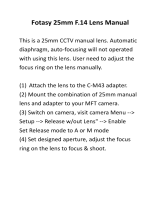
ZENMUSE X5R
User Manual
14
©
2016 DJI. All Rights Reserved.
List of Settings
Photo
Shooting Modes
Single Shot, HDR Shot, Burst Mode (3/5/7),
AEB (3/5 bracketed frames), Timed-lapse(5s/7s/10s/20s/30s)
Image Size 4:3, 16:9
Image Format RAW, JPEG, JPEG+RAW
White Balance Auto, Sunny, Cloudy, Incandescent, Neon, Custom (2000K~10000K)
Style Standard, Landscape, Soft, Custom (Sharpness/Contrast/ Saturation)
Color
D-Log, D-Cinelike, None, Art, B&W, Vivid, Beach, Dream, Classic,
Nostalgia
Video
Video Size
4K (SSD RAW): 4096 × 2160 24p, (3840 × 2160) 24/30p
2.7K (SSD RAW): 2704 × 1520 24/30p
1080P (SSD RAW): 1920 × 1080 24/30/48/60p
Video Format
Micro SD: MP4/MOV (Codec: H.264)
X5R SSD: CinemaDNG (Codec: Lossless JPEG)
NTSC/ PAL PAL, NTSC
White Balance Auto, Sunny, Cloudy, Incandescent, Neon, Custom (2000K~10000K)
Style Standard, Landscape, Soft, Custom (Sharpness/Contrast/ Saturation)
Color
D-Log, D-Cinelike, None, Art, B&W, Vivid, Beach, Dream, Classic,
Nostalgia
General
Quick Preview Off, 1s, 2s, 3s, 4s, 5s
Anti-Flicker Auto, 50Hz and 60Hz
Show Grid Off, Grid Line, Grid + Diagonal, Center Point
File Index Mode Reset, Continuous
Others
Histograms, Video Captions, Over Exposure Warning, AF Assisted
Focus, MF Assisted Focus, Lens Profile, Calibration, Reset Settings,
Format SD Card, Format SSD
Note: Be sure to calibrate the camera lens in the DJI GO app for manual zoom to work properly.




















